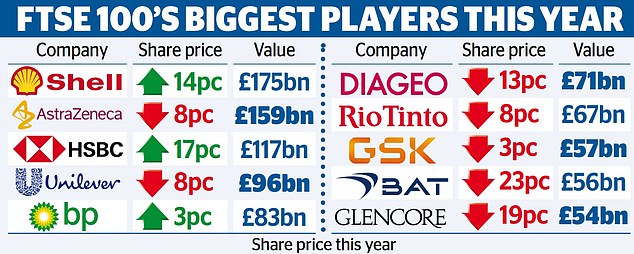Despite the gloom, UK markets are under-priced: I’m backing Britain… Are you, Mr Hunt?
Support for Britain: Americans have told the British that the British stock markets are filled with bargains
Since the beginning of the year, the Americans have been telling the British that the British stock markets are filled with bargains. So far, however, this message has failed to excite British investors.
If you are among them, it may be worth examining your position as some analysts describe the UK markets as a ‘screaming buy’ for those willing to sit on the sidelines for five years.
The bidding speculation surrounding mighty BP, the fifth largest member of the FTSE 100, could be a sign of near-term excitement ahead as inflation and interest rates stabilize. BP shares are at 499p. Michele Della Vigna, the influential oil sector analyst at Goldman Sachs, rates the shares as a buy and sets a price target of 640p this week.
This rating reflects the view that we are not sufficiently nurturing our domestic companies because we are so seduced by the glamor of US tech giants and other constituents of the S&P 500 index. Alec Cutler of fund manager Orbis believes that many UK companies would be twice their capitalization if they were listed on the S&P.
Amid the gloom, it can be easy to overlook that our markets are not small-scale but global. Less than a quarter of FTSE All-Share companies’ revenues are generated here at home.
At the same time, there is considerable pessimism in some quarters about the prospects for UK markets, regardless of the qualities of their constituents and the geographically diversified nature of their activities. Even fans of the UK market, like Cutler, acknowledge that government ‘dysfunction’ is responsible for part of their predicament.
Charles Hall, head of research at Peel Hunt, says our markets are shrinking thanks to private equity takeovers of British technology names and a sharp fall in the number of companies going public. He says: ‘We are currently in a doom loop – where valuations are low and liquidity is declining.’
David Coombs, head of multi-asset investing at Rathbones, says share markets are being held back by ‘a lack of innovative thinking from government’, corporate tax increases – and by management who he believes are less capable than those leading . Corporate America.
But America’s financial giants continue to look on the bright side of Blighty. In the past year, the FTSE 100 is down 3 percent, while the FTSE250 is down 11 percent. These don’t have to be catastrophic declines. Yet US bank Morgan Stanley said in mid-summer that UK shares were the cheapest in the world, ready for a recovery if inflationary pressures eased.
Goldman Sachs has highlighted the UK’s attractiveness and calculates that our leading companies deliver a 6 per cent return to shareholders.
At the turn of this century, UK equities made up around 40 percent of UK pension fund portfolios; this has now fallen to 4 percent. Fund manager Nick Train said Americans are replacing the British, making investments in Experian, the London Stock Exchange, Relx and others.
Diageo, the drinks giant that owns brands like Johnny Walker, now publishes its results in dollars. But its range also includes tequilas such as Casamigos and its shareholder is the eminent American fund manager Warren Buffett, boss of Berkshire Hathaway.

Nick Train does not expect the US presence on the share registers of these companies to ensure a quick turnaround. But he does argue that they could prove to be an inept team. For example, Nelson Peltz, the New York activist investor and father-in-law of Brooklyn Beckham, who forced Procter & Gamble to reform itself, now sits on the board of Unilever, maker of Dove, Domestos and Ben & Jerry’s.
If you believe Peltz can revive Unilever’s strategy, which has been called ‘disappointing’ by some major shareholders, then it could pay to stick with Train, Finsbury Income & Growth and Lindsell Train UK Equity funds , which own large parts of the group’s shares. .
But it’s worth noting that the majority of analysts rate Unilever as a hold rather than a buy, and the UK markets will continue to divide opinion – like Unilever’s most famous product Marmite. Coombs buys British shares, but he chooses government bonds, that is, government bonds, instead of shares. He notes: ‘If there is any undiscovered value, our extensive research hasn’t uncovered it: this year we switched from Diageo to McDonalds.’
In recent months I have been supporting Britain, motivated by quiet confidence rather than bullishness, and putting money into the likes of Diageo, Marks & Spencer and various funds. The City of London Trust, which owns AstraZeneca, BP and 3i Group, is trading at a slight discount to its net asset value (NAV), suggesting an opportunity.
But should Chancellor Jeremy Hunt do something to make UK markets great again in his autumn statement this month? Certainly.
Some links in this article may be affiliate links. If you click on it, we may earn a small commission. That helps us fund This Is Money and keep it free to use. We do not write articles to promote products. We do not allow a commercial relationship to compromise our editorial independence.
